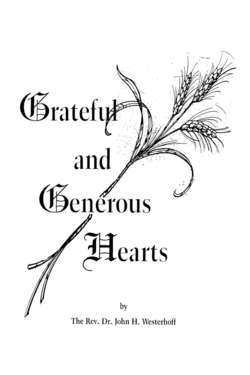Читать книгу Grateful and Generous Hearts - John H. Westerhoff III - Страница 7
На сайте Литреса книга снята с продажи.
A Confession
ОглавлениеMy theology of stewardship has always been orthodox. My problem, however, was that what I believed in my head I did not believe in my heart. To be personal and I hope not self-serving, for many years I had difficulty living faithfully in terms of my stewardship of money. I rationalized. I worked long and hard for everything I earned, for less than I reasoned I was worth and my family deserved. I made my contribution to the church through my labor, my time and my talents. And while I made a pledge each year, it was very little. As you may guess, I never preached on stewardship. I told my parishioners that the financial aspect of the church’s life was their responsibility. Over the years my guilt increased, for I knew my stewardship was poor and my life of faith flawed.
Then a number of years ago, Caroline, with whom I had worked for many years, and I talked about the possibility of marriage. Early on she made it quite clear that if we did marry we were going to pledge a minimum of ten percent of all our earnings to the church and it would be the first check written each month. That was the beginning of my conversion.
Amidst these conversations on stewardship two memories surfaced. The first was working with Caroline in New York sometime earlier. We had finished a long day and were going out for supper. Walking up Fifth Avenue, we looked down and there was a large bill in a doorway of a closed business. She picked it up, looked around, and saw that no one around us seemed to have lost it. I’m embarrassed to say my first thought was that it would take care of supper. We walked a few feet. In front of us was a group of street musicians. Caroline dropped the bill into their offering basket, saying, “It came from the street—it needs to go back to the street.”
The second was a conversation with Peter Lee, the present bishop of Virginia, who was at one time my rector, colleague, and friend at the Chapel of the Cross in Chapel Hill, North Carolina. One day he told me of his father during an economic recession. While he was in college, he sent a letter to Peter saying that he was experiencing some financial difficulties. He explained that he would not consider cutting or even reducing his pledge, his promise to the church. That would be paid first, no matter what, so Peter had better find a job and apply for a scholarship because otherwise he would need to drop out of school.
Today, Caroline and I do tithe. I feel good about that, and now I have no trouble talking about money and stewardship. Our habit is to pay by check, the first written each month. But Caroline, who sits in a pew most weeks, insists on making an additional weekly contribution because she believes that this symbolic action is an important part of the liturgy. She also lives by an important principle, namely that if there is only one bill in her wallet, that is what she will offer. She came home a few months ago and with a glint in her eyes told me of her morning’s struggle of conscience when she looked in her wallet and discovered that all she had was a very large bill. Then she looked at me and said, “What do you think I did?” “That’s easy,” I responded. “You gave it!” “Right,” she said. “I’m glad you did,” I commented with a chuckle, “but next time why not check your wallet before you come to church.” I knew she wouldn’t.
